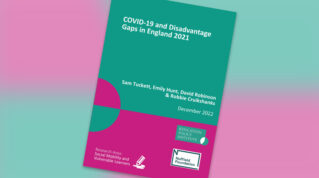Face masks should be worn in communal areas and close contacts of people with the new Covid variant Omicron should isolate for 10 days, regardless of vaccination status.
The changes to education Covid guidance (in full below) were communicated to principals in a Department for Education email sent at just after 4pm on Sunday.
A blog by the DfE adds the changes come into force on Monday, and full guidance was published on Monday morning. The guidance covers sixth form colleges, general FE colleges, independent training providers, designated institutions, adult community learning providers and special post-16 institutions.
New measures announced by the government yesterday, including mandatory face coverings in shops and public transport, will start on Tuesday.
Three people with the Omicron variant have now been identified in the UK.
DfE said the measures will be introduced as a “precaution to slow down the spread of the [Omicron] variant while we gather more information”. As such, the measures below are temporary.
“We will continue to keep this under review as the situation develops.”
Here’s what FE settings need to know …
Face masks ‘should’ be worn in communal areas
Face coverings “should be worn by students, staff and adult visitors when moving around FE premises, outside of classrooms or indoor teaching areas, such as in corridors and communal areas.”, the guidance states.
Students should continue to wear face coverings on public and college transport.
It is still the case the face coverings are not required in teaching areas, however FE providers continue to have discretion to require them in particular circumstances. For example, DfE say, “where teaching settings are more reflective of a workplace environment, such as a training kitchen.”
10-day isolation for Omicron close contacts
The current guidance on contact tracing and isolation remains unchanged.
However, in addition, any “suspected or confirmed close contacts of the Omicron variant will be asked to isolate for 10 days regardless of vaccination status or age”.
Education settings are not expected to undertake contact tracing, with NHS Test and Trace identifying positive cases.
The guidance adds: “You will be contacted directly and told to isolate.”
Re-consider international trips
The guidance says education providers “will want to consider whether to go ahead with planned international educational visits at this time, recognising the risk of disruption to education resulting from the need to isolate and test on arrival back into the UK”.
South Africa, Botswana, Eswatini, Lesotho, Namibia and Zimbabwe were moved onto the “red list” on Friday. Angola, Malawi, Mozambique and Zambia were added today.
DfE said it had discussed the update with unions ASCL and NAHT, alongside the CST multi-academy trust membership body. They “agreed it would be helpful to issue today rather than wait until Monday”.
Education secretary Nadhim Zahawi pledged to “continue to prioritise children’s and young people’s education and wellbeing, making sure education and childcare settings are as safe as possible and children continue to benefit from classroom teaching”.

















Your thoughts